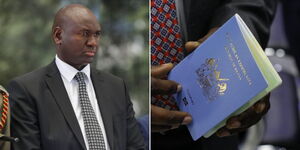The Nakuru High Court has issued urgent orders for top government officials to submit a comprehensive plan to combat the ongoing flash floods wreaking havoc across the country in three days after being served.
Interior Cabinet Secretaries Kithure Kindiki, Kipchumba Murkomen (Transport), Soipan Tuya (Environment, Climate Change, and Forestry), and Ezekiel Machogu (Education), as well as Attorney General Justin Muturi, and the National Disaster Management, have been directed to develop disaster prevention, surveillance, control, and response strategies in response to a petition filed by the Law Society of Kenya.
In his orders issued on Friday, May 3, Justice Samwel Mohochi invoked the gravity of the situation by issuing conservatory orders for the government to respond to the petition within three days, offering details on how the government will combat the unprecedented flooding across the country.
Justice Mohochi, stated, “A conservatory order in the nature of a structural interdict is hereby issued, compelling the respondents, in their respective ministries, to prepare and present to the court for scrutiny, a contingency plan on prevention, surveillance, control, and disaster response systems to avoid further loss of lives and property due to the ongoing flash floods, pending the hearing and determination of this Application.”
The court's intervention comes in the wake of escalating fatalities and widespread destruction attributed to the relentless floods, which have claimed the lives of 210 people and affected over 27,586 individuals.
LSK's Deputy Secretary, Florence Muturi, submitted the petition on Monday, April 29, demanding accountability from government ministries regarding their actions to mitigate the flood crisis. The court has scheduled a hearing for Friday, May 10, to review the proposed contingency plan.
While speaking to BBC on Monday, President William Ruto defended his government’s response to the floods stating, “This is not the time for a blame game, we should just address ourselves to the issues, and move with speed to respond. I ask citizens to move away from areas of danger.”
Ruto urged leaders and Kenyans at large to restrain from blaming each other over the recent occurrences, and instead work together to mitigate the same.
Following recent criticism from county leaders on the national government’s response strategy to the affected areas, Ruto explained that the county budgets were flexible enough to accommodate such emergencies.
“The instruments that have been built into the budget give all governments, at all levels emergency resources. There is always room for any county to adjust their budgets to take care of emergencies,” he noted.
Amidst the judicial proceedings, two concerned citizens, Anthony Machui Manyara and John Wangai, have taken their plea directly to Parliament.
They seek to compel President William Ruto's administration to declare the floods a national disaster, which create a more concerted efforts to combat the flooding.
Manyara and Wangai, the petitioners behind the impassioned plea to Parliament, emphasize the widespread devastation inflicted by the heavy rains, which have triggered catastrophic flooding across the country.
"We pray the honourable National Assembly to compel National government to expeditiously declare floods a national disaster, invoking the necessary legal mechanisms for effective management and coordination," their petition, received by the clerk of Parliament, states emphatically.
Their call to action extends beyond mere declaration, advocating for concrete legislative measures and resource allocation to implement comprehensive flood risk reduction and management strategies.
"We call upon the National Assembly to compel the relevant government agencies to collaborate with stakeholders, including affected communities, civil society, and the private sector, in developing and implementing sustainable solutions to mitigate the impacts of floods," they assert.
The urgency of their appeal stems from the recent government data, which highlights the far-reaching consequences of the floods, including mass displacement and extensive damage to property and agriculture across numerous counties.
"The climate change exacerbates the frequency and intensity of floods, posing a significant threat to Kenya's sustainable development and socio-economic stability," they add, underlining the profound implications of environmental degradation on the nation's future.












